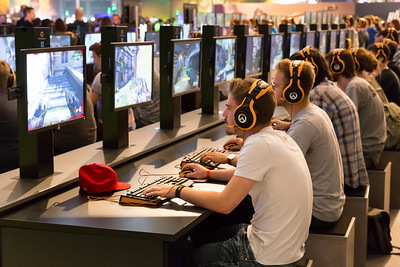Examining the Exterior Levels of eSports Flexibility
Taken increasingly seriously as a form of professional competition, the uniqueness of eSports continues to set it apart from its traditional contemporaries. Not just in terms of the games and gameplay, the different external constituents of the eSports whole paint a picture of flexibility. For developers and the surrounding industry, eSports is in a place where few other sports can reach. The advantages of the eSports system have helped this world become the billion-dollar industry it is today, with constant evolution showing no sign of slowing down.
Professional Competition
Holding competitions in traditional sports is fundamentally limited by space. Professional standards in equipment and arenas mean that suitable locations can be difficult to find, but this isn’t as much the case with eSports. In eSports, all players need to compete properly are high-speed computers and the right input devices. Practically every city in the world has hundreds or thousands of these computers available, alongside the requisite connection technology to set up matches.
Extending this idea is how eSports games don’t technically need to be played in direct proximity to the other team. As long as the players are within a few hundred miles of each other, high-speed internet connections can ensure smooth online experiences without ever needing to meet in person. In fact, that’s how some of the biggest tournaments like ESL Online have been held in the last few years, and it’s a standard the industry embraces openly. This isn’t just cheaper than renting stadiums, it also allows players a level of freedom that no other sport offers.
Surrounding Market
Capitalizing on professional sports is part and parcel, but the reach and global popularity of video games streamline this process more than what we see in other forms of competition. Traditionally, sports tend towards certain countries. On the extreme end, we have American football, which isn’t widely played outside of America. Existing in a more international space is regular football, which is enjoyed in far more countries, but it’s not quite global. Video games, on the other hand, are only really bound by whether a country is technologically developed.
From this point, the global market surrounding eSports has a strong launching position. The most externally visible way this potential is illustrated can be seen through eSports and video game merchandise. Games like Overwatch are immensely popular in the world of collectibles, with eSports playing a huge part.
Stepping even further back, there have also been developments as far as betting industries that integrate with eSports. Modern iGaming software platform developers now build eSports betting directly into their systems. This allows newcomers into the online casino world to easily engage with offering eSports alongside traditional sports, alongside odds trading, risk management, and other modular tools.

“Overwatch” (CC BY 2.0) by wuestenigel
No matter from which angle you approach eSports, the landscape is broad and expanding. While this is to be expected from a new industry, just how far and quickly eSports have evolved caught many off-guard. At this rate, there’s no telling where eSports will be ten years from now, other than a bigger, better, and more valuable place.
For all the latest sports news follow PledgeSports on Facebook, Twitter, and Instagram.
